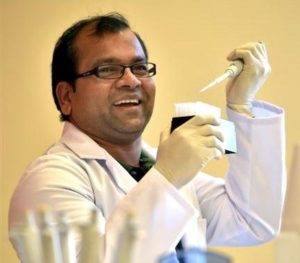Research Grant Recipient: Associate Professor Rajesh Katare
03/09/2018
Around 465 million people in the world suffer from diabetes – it is a growing health problem.

The Otago Medical Research Foundation is playing its part in looking at ways to combat this global health crisis, through financial support to the University of Otago.
Associate Professor Rajesh Katare from the University’s Department of Physiology has had an OMRF grant, with support from the Zonta Club of Metropolitan Dunedin, to investigate diabetes and its role in chronic heart failure. His research has the potential to help prevent or delay heart disease, and ultimately save lives.
The research had three components:
- Identify the mechanisms through which diabetes can damage the heart
- Search for easily detectable biomarkers that circulate in the blood so that diabetes-induced damage to the heart can be detected early, before there are clinical signs. One of Associate Professor Katare’s projects is working with paediatricians and children with type one diabetes to see if heart disease risk can be detected very early
- Develop personalised therapies based on commercially available biomarker tests that help primary health providers work with patients to prevent heart problems. Such therapies can make changes to suit lifestyle, or pre-clinical manipulations can be introduced that will delay or prevent heart disease. Currently cardiac stem cells treatment is being investigated as a promising treatment
“We’re lucky to have good long-term data – some of our samples collected from 11 years ago presents very good opportunities to look at any changes in heart health and corresponding changes in biomarkers in the blood,” he said.
“The good thing about Dunedin research is that it is very collaborative, which is the envy of some of our overseas colleagues; we conduct our investigations alongside clinicians and people in the community with diabetes.”
“We are now publishing papers on our research in prestigious journals because of the Foundation’s funding, which then means we can develop bigger projects at a higher level; we’re now fortunate to attract funding from a variety of sources.”